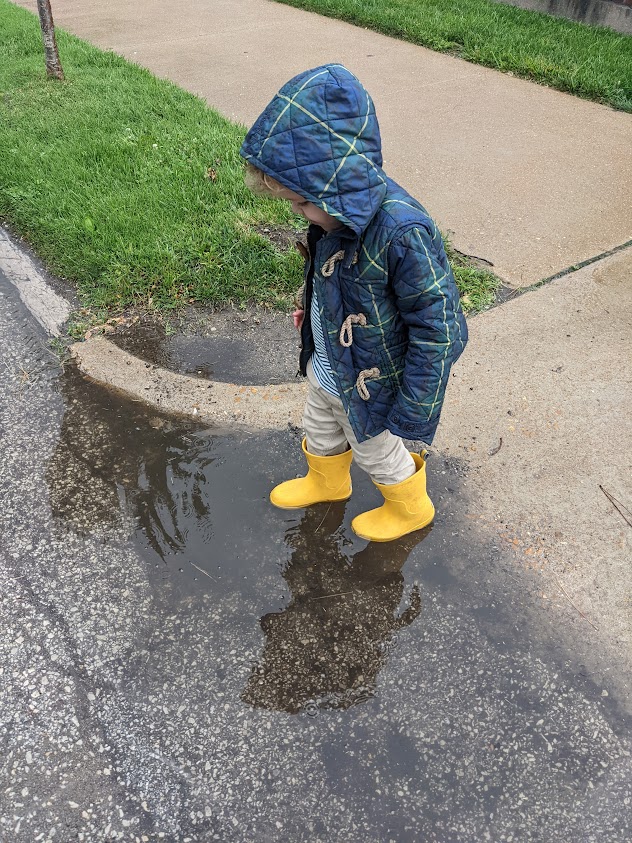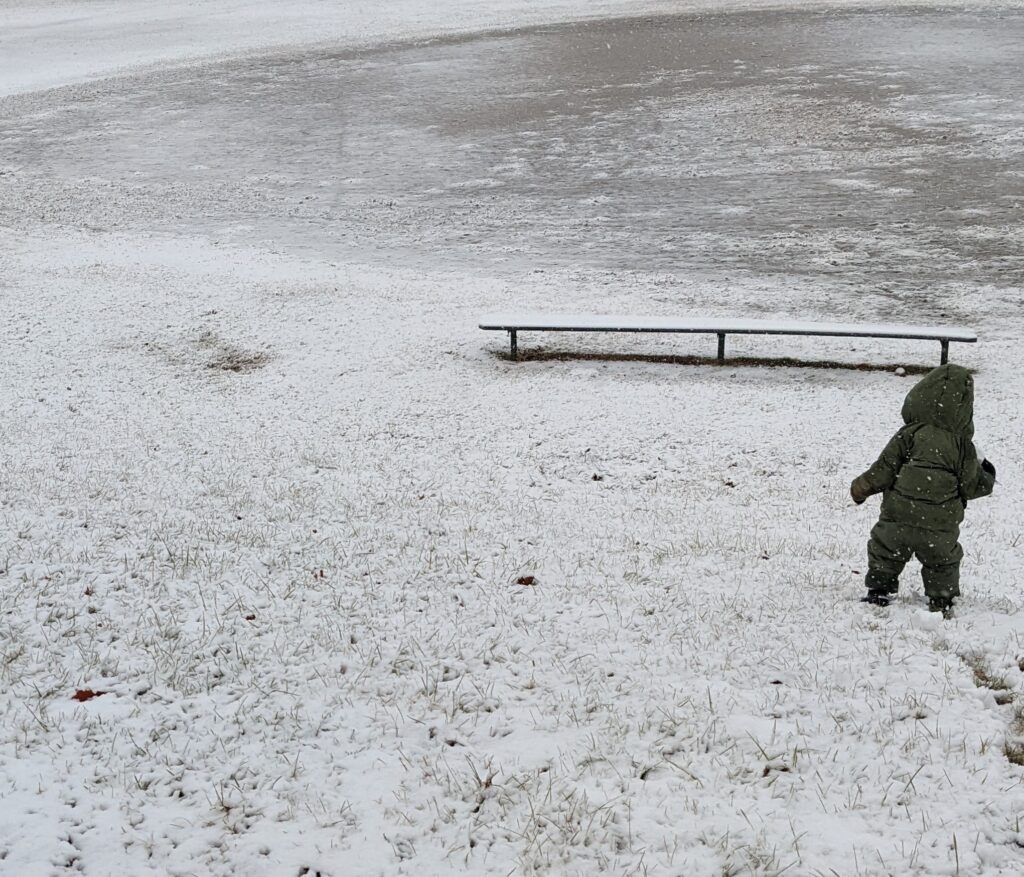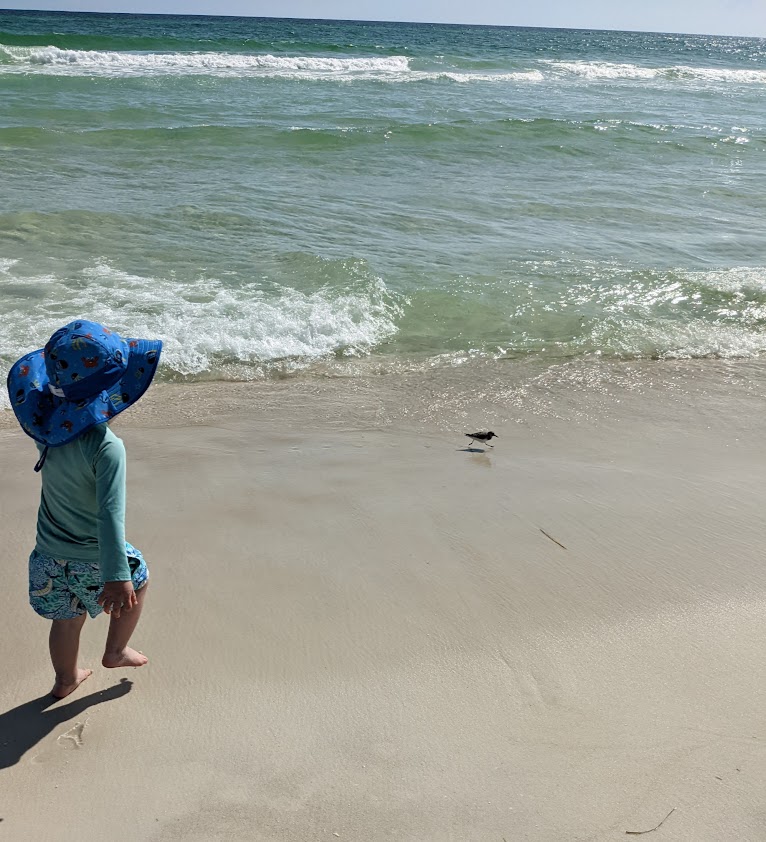When I worked at the Montessori School, outside time was a priority. We took the kids outside in sun, rain and snow. Whether it was on a nature walk or the playground, being outdoors was crucial for the kids (and the educators!). Our mental wellbeing was almost instantly restored after just a few breaths of fresh air. There is something about outdoors and mental health that just work!
Outside time continues to be essential for me and W. When he was a baby, there were moments when we couldn’t seem to settle him. Then we stepped outside, and he was instantly soothed. As he’s gotten older, we continue to spend lots of time outdoors. He wakes up happy and energized? Let’s go play outside. Skipped his nap? Let’s go on a nature walk. Throwing things and feeling rowdy? Outside we go! I recently came across a Scandinavian saying: “There’s no such thing as bad weather, only bad clothing.” Love that!

“There’s no such thing as bad weather, only bad clothing.”
proverb of Scandanavian origin

Benefits of Being Outside for Kids’ Mental Health
Being outside can have many positive effects on kids’ mental health. Here are some ways that being outside can benefit their wellbeing:
- Increased physical activity: When children spend time outside, they are more likely to engage in physical activities such as running, jumping, and playing games. Regular exercise is an effective way to improve mental health and reduce symptoms of depression and anxiety.
- Exposure to nature: Spending time in nature has a calming effect on the brain and reduces stress. Being in green spaces, such as parks or forests, can also improve mood and cognitive function.
- Social interaction: Outdoor activities often involve social interaction with others, whether it’s playing with friends or participating in team sports. Social support and connectedness, especially outdoors, are important factors in maintaining good mental health.
- Vitamin D: Sunlight is a natural source of vitamin D, which is essential for healthy bones and is linked to improved mental health.
- Reduction in screen time: Being outside provides a break from technology and screens, which can be overstimulating and contribute to anxiety and sleep problems. More on screen time recommendations and a plan to manage from the American Academy of Pediatrics.
Overall, being outdoors can have a positive impact on children’s mental health by promoting physical activity, exposure to nature, social interaction, and reducing screen time.

In conclusion, it’s clear that getting outside is important. So when considering ways to bolster your kid’s mental health, go outside. Have you noticed an improved mood in you or your kids after going outside? Please share!
Sources
Bratman GN, Hamilton JP, Daily GC. The impacts of nature experience on human cognitive function and mental health. Ann N Y Acad Sci. 2012;1249:118-136. doi:10.1111/j.1749-6632.2011.06400.x
Grudet C, Malm J, Westrin A, Brundin L. Suicidal patients are deficient in vitamin D, associated with a pro-inflammatory status in the blood. Psychoneuroendocrinology. 2014;50:210-219. doi: 10.1016/j.psyneuen.2014.08.020
Rosen LD, Lim AF, Felt J, Carrier LM, Cheever NA, Lara-Ruiz JM, Mendoza JS, Rokkum J. Media and technology use predicts ill-being among children, preteens and teenagers independent of the negative health impacts of exercise and eating habits. Comput Human Behav. 2014;35:364-375. doi:10.1016/j.chb.2014.01.036
Strong WB, Malina RM, Blimkie CJ, Daniels SR, Dishman RK, Gutin B, Hergenroeder AC, Must A, Nixon PA, Pivarnik JM, Rowland T, Trost S, Trudeau F. Evidence based physical activity for school-age youth. J Pediatr. 2005;146(6):732-737. doi:10.1016/j.jpeds.2005.01.055